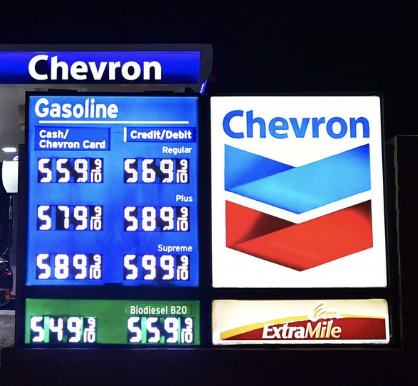A diesel scare
What the future has in stock.

Prices of fuel at a Chevron, following the recent events mentioned.
November 30, 2022
The United States is in crisis as the nation’s diesel supply plummets to dangerously low levels. The country holds 25 days worth of diesel left in its reserves, the lowest level since 2008.
“Unacceptably low” is what National Economic Council Director Brian Deese told Bloomberg TV on Wednesday when asked to describe the supply.
Following the COVID pandemic, demand for the fuel began to surge as companies began to recover. However, the need for diesel recovered quicker than the need for other fuels, such as gasoline and jet fuel.
“Such low levels are alarming because diesel is the workhorse of the global economy,” Javier Blas, from Bloomberg TV, said. “It powers trucks and vans, excavators, freight trains and ships. A shortage would mean higher costs for everything from trucking to farming to construction.”
Most of these recovering companies use trucks and trains for pushing goods, both of which rely on diesel fuel. If the diesel supply ran out, everything would stop. Trucks and trains would come to a halt, food would not be sent to stores, and packages would wind up missing.
For New Englanders, diesel is also used for heating homes. No diesel would lead to disastrous consequences, on top of the missing essentials listed previously. Certain regions in the area have started rationing, and the biggest utility in the area even asked the Biden Administration to begin putting an emergency plan in place.
The Biden Administration is looking into utilizing an emergency fuel stockpile in New England in order to help relieve the east coast. With only one million barrels in the stockpile however, experts are concerned that this measure will not do much to change prices and bring long term stability.
The Russian invasion of Ukraine can be blamed for the shortage as well, which continues to hurt global fuel supplies around the world. Imports from Russia have been banned in the United States, which has contributed to a steady increase in diesel prices across the nation. The national average has risen to be 50% higher than they were this time last year. With winter right around the corner, it wouldn’t be surprising if we see another sharp increase in prices.
It is uncertain what’s to come in the next few weeks. There is a possibility that the economy would crash if diesel does end up running out, leading to yet another crisis. Rebuilding the supply would require a slowdown in consumption and manufacturing/freight activity in order to rebalance the supply/demand ratio.











